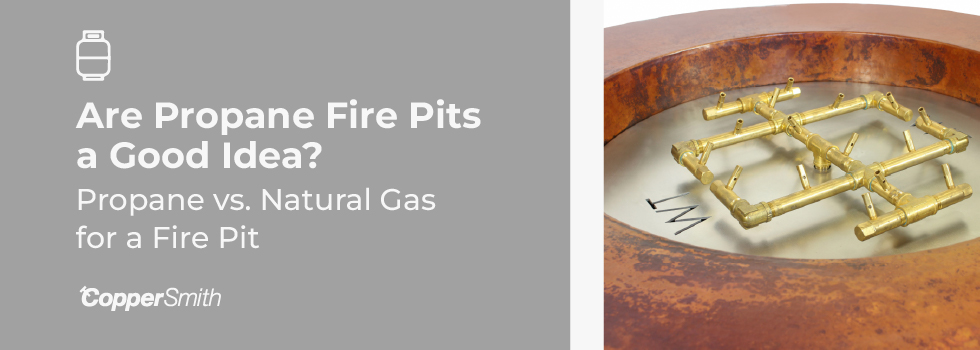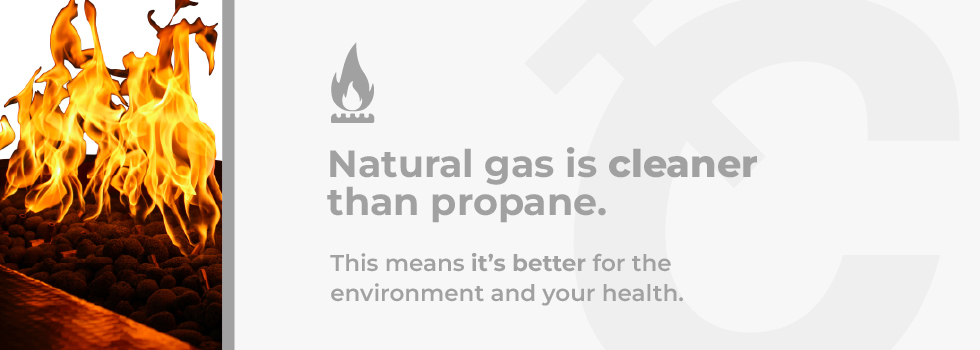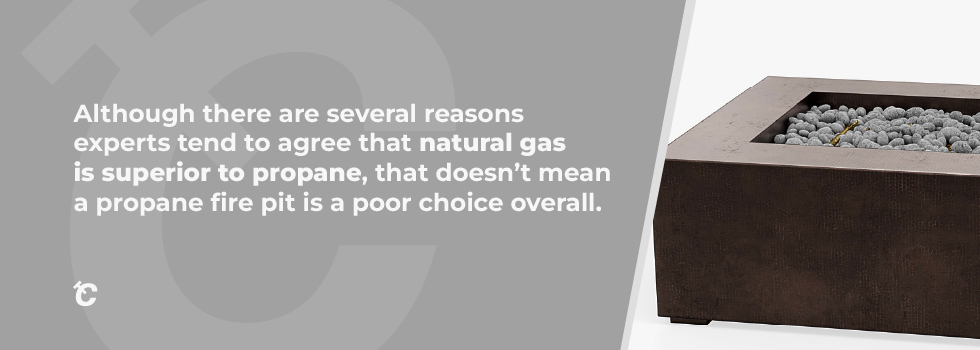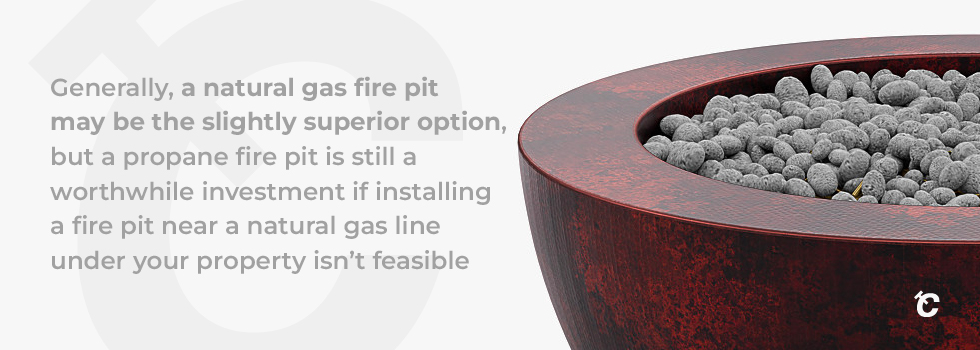
Why install a fire pit in the first place?
While there is much debate among experts as to whether propane or natural gas fire pits are better, there are many benefits associated with installing them within your garden.
Firstly, they help you to create the perfect atmosphere within your garden, whether you are planning on entertaining friends during garden parties and BBQs or simply looking for an excuse to spend more time outdoors.
Furthermore, various studies have found that when you invest in your outdoor spaces, the value of your property also increases. For example, many housing companies have reported that “a nicely presented garden alone can be seen to add 20% to your house value.” As a result, you may be able to get a better price when selling your property by installing a fire pit.
However, while there is something exciting about the idea of installing a traditional wood-burning fire pit in your home, there’s no denying that this requires a lot of work when it comes to maintenance and set-up. Conversely, propane or natural gas fire pits are easy to use; they do not require quite as much effort on your end, though the final result - a beautiful, roaring fire - is precisely the same.
How easy is it to care for propane fire pits vs natural gas fire pits?
Maintenance is another crucial factor to consider when setting up propane or natural gas fire pits within your home. After all, keeping them in good condition is essential when it comes to keeping yourself (and those around you) safe when the fire pit is in use.
Fortunately, both fire pits do not require too much in the way of upkeep, meaning they’re a great, low-maintenance addition to your home and garden. However, natural gas fire pits tend to require a little more attention, meaning they may need to be inspected more regularly.
Nevertheless, you should always ensure the fire pit (whether that be propane or natural gas) is cleaned after use. Thankfully, this can be achieved with a little bit of soap and water, though you should always ensure the pit has cooled before you begin this task.
You should also ensure that it is covered to prevent damage caused by rain and other adverse weather conditions when not in use. This will not only protect your fire pit from damage, but it will also extend its life quite considerably, meaning you can enjoy roaring fires for years to come.
Factors to consider when choosing a Fire Pit.
There are many different factors to consider when choosing a fire pit for your home. For example, you should consider the following:
- The amount of space available. Fire pits are available in various spaces; however, it's important that you choose a pit that corresponds with your garden accordingly. After all, a tiny fire pit may look out of place in a larger garden, where you have room for a much bigger fire.
- The design. There are many different designs available (for both gas and propane) fires, which means there’s truly something for everyone - regardless of your unique taste. For example, you may choose a brass fire pit or a copper fit - both of which are also available in a range of shapes, such as squares, rectangles, and circles.
- The costs. Costs are undoubtedly a deciding factor when it comes to choosing any form of home decor, and you must have a budget in mind before you start shopping, as this will help you to reign in your spending accordingly. However, you should also pay attention to the costs of running the natural gas fire pit vs a propane pit, as the costs of fuel may also vary accordingly, and it's important you can afford the upkeep as well as the installation. This figure, of course, will also alter depending on how frequently you plan on using your pit.
Ease of use. Another factor to consider when installing a fire pit is how easy it is to use and set up. After all, it's important you familiarize yourself with this process so that you are able to light a stunning fire as often as you’d like. Typically, both propane and natural gas fire pits are relatively easy to set up, especially when you consider alternatives such as wood-burning fire pits! On a similar note, you should also figure out how much time you can dedicate to the maintenance and upkeep of your firepit ahead of time, too.
When purchasing an outdoor fire pit for your yard, you must account for various important factors to determine which type of fire pit is ideal for your goals, budget, and overall preferences. The type of fuel your fire pit burns is one such factor.
Although some people are drawn to the rustic qualities offered by a wood-burning fire pit, you may prefer the convenience of a gas fire pit. There are many reasons this might be the case. For example, using the ignition system of a gas fire pit tends to be easier than lighting wood fires. This allows you to comfortably relax by your fire pit without having to spend too much time getting the fire started. However, not all gas fire pits are the same. Some get their fuel from propane tanks. Others use natural gas.
Both types of fire pit offer their pros and cons. Generally, a natural gas fire pit may be the slightly superior option, but a propane fire pit is still a worthwhile investment if installing a fire pit near a natural gas line under your property isn’t feasible. Keep reading to learn more about this subject.
Propane Fire Pits Are Great, But Natural Gas Fire Pits Are Even Better

All types of fire pits deliver unique advantages. That said, many experts agree that if a homeowner has the option to choose between a natural gas fire pit or a propane fire pit, they’re better off going with natural gas. The following are key reasons why:
Cost
Natural gas is less expensive than propane. This is among the top reasons many recommend opting for a natural gas fire pit over one that uses propane gas as fuel. Be aware that the upfront cost of a fire pit doesn’t reflect its full cost. You also need to consider how much money you will spend on maintaining and operating your fire pit over the years.
That said, if there are no viable natural gas lines currently running beneath your property, you’ll need to have one installed before you can install a natural gas fire pit. This may be somewhat expensive. Still, it’s an investment that may pay off in the long run. Having access to an affordable natural gas supply on your property can be advantageous in many critical ways.
Convenience
A propane tank doesn’t offer unlimited fuel. If you have a propane fire pit, you will need to routinely refuel your propane tank to use your fire pit. You’ll also need to pay attention to how frequently you operate it to determine when it’s time to refuel your tank. You don’t want to make plans to spend time outdoors with family and friends gathered around a warm fire, only to discover that you’ve run out of fuel unexpectedly. This isn’t a concern when your fire pit is connected to a natural gas supply. Natural gas is always available, ensuring you can operate your gas fire pit whenever you please.
More heat
The amount of fuel left in a propane tank can influence the size and heat level of a fire you start when operating a propane fire pit. If the tank is running out of fuel, your fires may be small, and they might give off less heat than you’d like them to. Natural gas doesn’t run out. As such, natural gas fire pits can deliver consistent heat output whenever they’re in operation.
Eco-friendliness and health safety
Although propane isn’t necessarily too harmful to the environment, natural gas is certainly more ideal in this regard. Essentially, this fuel source is “cleaner” than propane gas. It gives off less toxins when you burn it. Additionally, it releases less CO2.
You might consider this an important factor if you have any concerns about the degree to which operating a fire pit will impact your health and the environment. While fire pits are generally safe when used in accordance with a manufacturer’s instructions, you might understandably wish to purchase one that has an absolutely minimal chance of causing any harm.
Propane Fire Pits Offer Benefits, Too

Natural gas is typically considered to be a superior fire pit fuel source when compared to propane gas. However, there are some reasons why you might decide a propane fire pit is more in line with your goals. Lack of natural gas lines on your property is one such reason. Others may include:
Portability
One of the limitations of a natural gas fire pit is the fact that after a proper installation, it will be a permanent fixture that can’t easily be moved to another location on your property. A propane pit is often different. A propane tank can be moved from one spot to another quickly. Thus, many propane fire pits can also be relocated with minimal effort.
This may be an appealing trait if you’re the type of person who likes to rearrange your patio decor from time to time. If your propane fire pit is a portable model, which is often the case, you can experiment with placing it in various parts of your lawn or patio space as you add or remove furniture and decor throughout the years. A natural gas fire pit doesn’t offer this degree of flexibility.
This is also worth keeping in mind if you think you might move to a new home sometime in the near future. If so, installing a new natural gas fire pit on your current property may not be worth your money unless your goal is to add to your home’s value. You might be better off buying a propane fire pit that you can take with you when you move.
Ease of installation
Installing a propane fire pit is usually an easy process. Because it doesn’t need to be hooked up to a natural gas line, installing your fire pit is as simple as carrying it to a chosen spot on your property. Hook up the propane tank, and you’re ready to enjoy relaxing evenings around a fire. Comparatively, the process of installing a natural gas fire pit is lengthier.
Impressive fire
As was mentioned earlier, natural gas is cleaner than propane. This means it’s better for the environment and your health.
However, it also means the flames it produces tend to be clearer than the bright yellow flames a propane fire pit may give off. If you want to make a strong impression on your guests with a fire pit that offers a truly gorgeous display, you might be more drawn to propane.
Choosing Gas Fire Pits: Factors to Consider

There is no single type of fire pit that’s universally “better” than all others in every way. Although there are several reasons experts tend to agree that natural gas is superior to propane, that doesn’t mean a propane fire pit is a poor choice overall.
You have to consider what’s most important to you when browsing gas fire pits. Do you want a permanent fire pit that you can operate without spending much money on fuel over the years, or do you want one that can be moved to different spots on your property whenever you see fit?
Ask yourself these types of questions when considering your options. Doing so is key to determining which type of fire pit is the right one for your home from CopperSmith. Consider having another great center piece for your kitchen, a range hood also represents a great investment for you home aesthetics!




